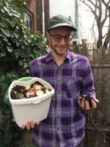When the Left-Hand doesn’t know what the Right-Hand (PLA) is doing.
originally found here: http://woodsend.org/2013/09/left-hand-doesnt-right-hand-pla-doing/ American and European consumers are very familiar with PLA widely marketed as compostable for just about everything from chip-bags to golf-tees. This renowned PLA, a biological plastic made from a “left-hand” lactic-acid molecule, also has a quirk: it requires a pre-heat phase before it will actually biodegrade. That trait is referred to as Tg or “glassy transition” in the trade. Tg is a feature of all plastics and can occur over a very wide range of temperatures, but none as convenient as PLA’s at 55-58°C, making it eligible to be called compostable,- that is, if the compostability test is conducted at or just above the Tg temperature. To be certified compostable means a standard is upheld such as ASTM 6400 for USA or EN 13432 for…
